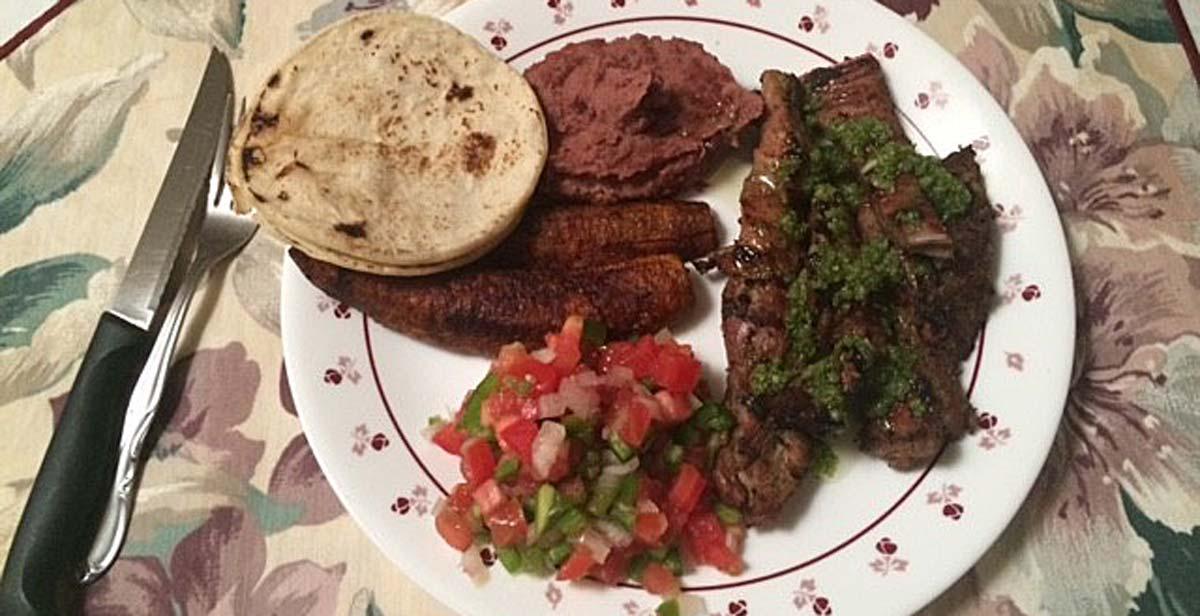It is undeniable that in the UK we are rather detached from where our food comes from. When you walk into a supermarket you are confronted by an endless variety of products sourced from all over the world: grapes from Spain, tomatoes from Italy, lamb from New Zealand, and indeed Honduras provides a portion of the fruit and vegetables sold in UK supermarkets.
This detachment from our food contrasts quite heavily with Honduras. Whilst there are supermarkets here, and some products are imported, there is a much greater focus on eating domestically grown produce. Organised agricultural activity in Honduras can be traced back to the Mayan civilisation, and the main foods that are produced have changed relatively little since that time. Maize, rice, beans, avocados, bananas, and plantain remain the core staples in the Honduran diet, and it is very rare to have a meal, which does not contain at least one of these. Indeed, a typical breakfast or dinner might consist of rice, beans, plantain, and avocado, typically served with tortillas, which here are made with maize rather than wheat. The extent to which carbohydrates feature heavily is quite noticeable. Eggs also feature, as does meat, however clearly meat is one of the more expensive foodstuffs, and thus is consumed rather less than in the UK. Here in Central Honduras the lack of fish is notable; in Britain, regardless of how far one is from the sea (admittedly never very far) it is always taken for granted to be able to access fresh fish. This is broadly not the case here, although the exception to the rule is Tilapia and Red Carp, which are farmed intensively throughout Honduras, though they are also exported. The export of foodstuffs is incredibly important to the economy of Honduras, and vegetable products account for over 16 per cent of the country’s export trade.
The notion of seasonality is growing in popularity - or at least is becoming more fashionable - in the UK, with numerous restaurants proudly boasting to serve ‘fresh, seasonal, British produce’. However, we still take it for granted to be able to walk into a shop and buy oranges, strawberries, and mangoes, regardless of the season and whether or not these foods are indigenous to the UK. Seasonality is a much more present concept in Honduras, not because of a desire to only eat what is in season, but at least partly from economic necessity. As an ardent fan of avocados, I was alarmed to find out that the season is currently coming to an end in Honduras, but relieved when my host mother told me that, when out of season in Honduras, avocados are imported from Mexico. Thus we should not think of the Honduran diet as being entirely dictated by seasonality, but it is important to consider the distance that their imports travel. Mexico is relatively nearby, thus the cost of importing is relatively low, and around 70 per cent of Honduran imports come from Central and North America, with the USA being by far Honduras’ biggest trading partner. If we consider how in the UK it is the norm to import fresh produce from as far afield as Central America (bananas being a prime example), the contrast is striking.
Whilst the traditional Honduran diet is relatively healthy, its carb-heavy nature certainly seems more suited to those who work in manual, especially agricultural, jobs. Such jobs still account for a major employment sector in Honduras, however there is now a growing number of people working in more sedentary occupations, where such a diet appears less appropriate. Compounding this issue is the fact that fast-food chains from the USA have become hugely popular in recent years, indeed some are even given generous tax breaks by the Honduran government because they are an important source of employment. Thus in addition to the more traditional diet, an ever increasing amount of junk-food appears to be making its way into the Honduran diet, not to mention the popularity of carbonated sugary drinks - it is hard to walk down a street without seeing at least one poster advertising Coca Cola or Pepsi. Laws have even been introduced to try to combat this growing issue, with children under the age of 11 technically not allowed to consume sugary drinks, though it is quite clear such rules are not observed. Despite the rising popularity of these types of the food, thankfully the traditional diet still appears to be pre-eminent, and it is easy to see why: after all, why would you bother to go to the effort (and expense) of importing alternative food when fresh, nutritious, and - most importantly - delicious food is growing all around you?
Honduras facts and figures
Vegetable products: 16 per cent of exports
Bananas: 2.9 per cent
Melons: 1 per cent
Coffee: 10 per cent
Imports from Central and North America make up around 70 per cent of Honduras’ imports.
Obesity rate: 18.4 per cent (adults), UK rate is 24.8 per cent
Rates of diabetes in line with rest of South and Central America
Main export market is USA, but also other Central American countries and the EU.
Written by ICS volunteer David Bell



